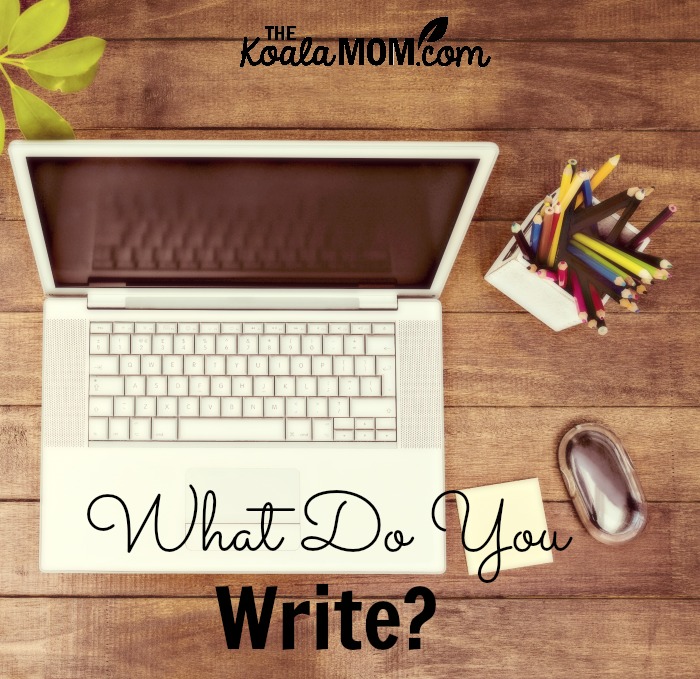Someone asked me the other day about my writing – how I write, how I come up with ideas, what I write about. While I am nearly always thinking about something to write, I realize this isn’t “normal” for most people. Here are some reflections on writing, for those who wonder what it’s like to be a writer.
How Did You Become a Writer?
By reading lots. I was a voracious reader growing up, always asking my mom for more books to read. I had an adult library card long before I was 18, because on a youth card I could only withdraw four books at a time and that wasn’t enough to get me through the week before we got back to the library. Reading would often make me think of my own stories, and I’d close my book and move to the computer to work on one of my novels.
As a teen, I knew I wanted to pursue a career as a writer. I didn’t want to be a journalist, however, as many people expected when I said “writer.” After I graduated from high school, I completed a Bachelor of Arts degree in English at a local university. This let me read and discuss lots of great literature, while thinking about my own writing.
Next month, my husband and I are returning to school. He’s working towards a law degree while I’ll be starting a writing degree, using my first degree as credit towards my second. I’m excited to have the chance to workshop my writing with other writers and to learn from excellent writing instructors.

When Do You Share Your Writing?
Most of my writing sits on my computer, unread, except for what I share on my blog. I printed the first two novels I wrote (as a teen) for my family to read (after they spent years pestering me to let them read one of my stories). I’ve also had short nonfiction articles published in a variety of newspapers and magazines. Most of my poetry remains in a folder in my desk drawer.
Sooner or later in writing discussions, the same question comes up: when do you share your ideas with other people? I think most writers are in agreement that you share your ideas or stories with your audience when you feel it is ready to be shared. We joke that our stories are “babies,” and maybe that’s a good analogy.
A baby spends nine months hidden inside its mother’s womb, growing, developing, preparing for life in the world. It doesn’t always take me that long to write something – and sometimes it takes longer than that – but my stories also needs to grow, develop, prepare. During that time, I keep the story hidden in my mind, and probably won’t say much about it. What am I writing, you ask? A story about a girl.

How Do You Write a Novel?
Writing a novel is like driving a car at night. You can only see as far as your headlights, but you can make a whole trip that way. ~ E.L. Doctorow
I’ve written most of my novels this way. My first novel started with an image in my head, a vague idea. I wrote that down, and then I kept writing. The idea became the prologue. By the time I hit about 150 pages (single-spaced, typed), I figured I should be ending the novel, but I couldn’t see the ending yet. Then I had a nice vague discussion with my dad about what I was writing, and from that hatched the idea for the ending.
Writing novels like this, however, can end up in lots of unnecessary side trips. A novelist can even get lost, just as an explorer. While some writers have an unconscious grasp of novel structure and pacing, others don’t. Reading Larry Brooks’ book Story Engineering made me realize that writing a novel takes planning as well as inspiration. If I ever get around to writing another novel, or editing my current novels, I plan to use Brooks’ ideas to improve my plot.
You Might Be a Writer if…
Sharon Hinck said you might be a writer if (among other things), “A police car with sirens blaring drives in to a scene you’re writing – and you didn’t see it coming.” Writing is about getting caught up in the story, knowing your characters so intimately that you are just writing down what they are doing and sometimes what they do surprises even you.
I can see my characters in my head, hear what they are saying to each other, feel their emotions. When writing one scene in one of my novels, I sat at my computer bawling my eyes out. My character had just found out her mother had died, and she was miles away from her home and family, grieving by herself. It was a good thing there was nobody else around the house right then!
What Do You Write?
When I say I’m a writer, I’m ofted asked, “What do you write?” I should keep a few business cards in my back pocket, so I can just whip one out and say, “You can check out my blog if you’re interested.” Usually, however, I mumble something about “fiction, nonfiction, pretty much anything.”

I’ve written novels. I’ve dabbled in poetry and short stories. I’ve published newspaper articles. At one point in my life, I would have said I just wanted to write novels. Since then, however, I’ve written a lot of other things, including things I never thought I could write—even a sports article! While my favourite genre is still long-form fiction, I’ve realized that writing skills cross many genres and it can be fun to play in other forms.
How Do You Find Ideas?
A story is always percolating in the back of my brain, ready to be written down when it gets formed enough. I saw a man walk onto the bus the other day, and that started a story.
Sometimes something will remind me of another character, another story, and I’ll get thinking about what I want to change or add. Half of my brain can be away in a story while the other is doing what I’m supposed to be doing – editing a manuscript, making supper, cleaning house. Give me a computer and watch my fingers fly.
The topic for one writing challenge was “sport or fitness.” I looked at that and immediately put myself into a spectator role, because that’s usually where I am with sports. Then I got stuck with going further, because of how little I know about sports (just ask my husband, whom I emailed once upon a time to ask if our Canadian football teams played in the NFL). My mind switched to fitness and from there to swimming, which is what I usually do for fitness. Add some conflict (a key element in any story) and my story was hatched.
What Inspires You to Write?
A good story, whether in a book, a movie, or a song. Songs often get me thinking of stories, because they can only tell part of the story and leave the rest to your imagination. Feelings, a strong emotion, also inspire me, as I try to capture that feeling through my characters.
Who is Your Favourite Author and Why?
Emily Bronte; her novel Wuthering Heights is one of the best novels of all time. I’m amazed that she could write only one novel and that it is so good (I always wonder what else she would have written if she hadn’t died young).
The first time I read it, I didn’t really like it; yet it stayed with me, bothering me, until I read it again about six months later. Then I liked it. A few years later, after talking about it with a friend, I read it again and loved it—and that was just before I studied it in one of my university English classes.
On a contemporary note, another favourite author is Lisa Samson. I’ve read her first novel and her latest and the difference between the two inspires me. She shows me that not every writer is a one-book wonder like Emily Bronte who gets it right on the first try; most of us learn and grow as we continue writing, getting better with each book or story that we write.
Why Do I Write?
Several years ago, I was surfing the web (something new to me, as we’d just gotten Internet shortly before that) and discovered ICWF, a local Christian writer’s group. I immediately joined.
A few years later, the editor of the group’s newletter contacted me to write an article for them. I puzzled over that for several days. What would I write? Finally I came up with a topic. I asked myself why I wrote. The answer was because I must. I can’t not write.
More Advice about Writing
Other Writers Talk about Writing
- Dayna Mazzucca talks about Writing
- Julianne Harvey: a multi-tasking writing style
- Betty Jane Hegerat on writing historical fiction / nonfiction
- Donna Dawson on Writing and Publishing Books
- Kathleen Gibson talks about reading and writing
Are you a writer? How would you answer these questions about writing?

2 Comments
Great blog! I am using the E.L. Doctorow quote in one of my handouts for the course. I love it. I completely agree with what you have said here, and said well, and the fact that we always have stories percolating is what makes us writers. Embrace it and stand tall. You are a writer!
Yup, I can relate to all of this!
“Everyone who does not need to be a writer, who thinks he can do something else, ought to do something else.”
Georges Simenon